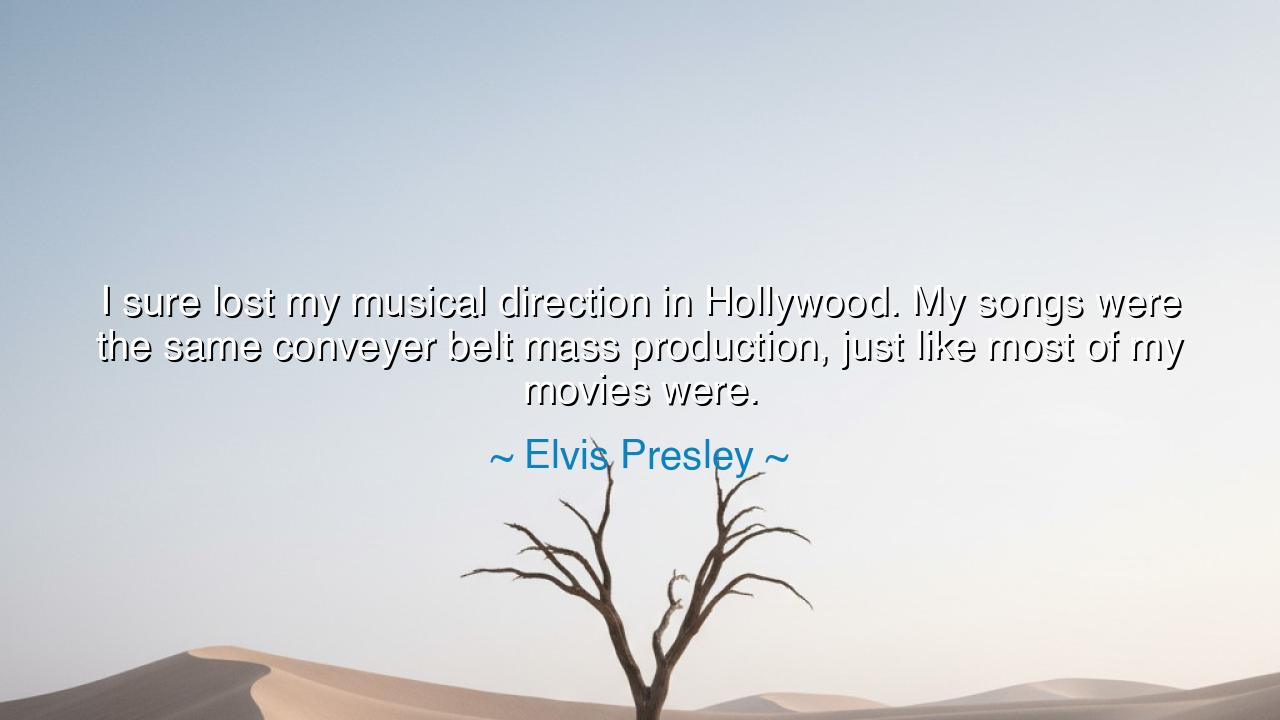
I sure lost my musical direction in Hollywood. My songs were the
I sure lost my musical direction in Hollywood. My songs were the same conveyer belt mass production, just like most of my movies were.






In the journey of every artist, there are moments when the path becomes obscured, when the very essence of creation—what makes it authentic, unique, and true—is lost in the hustle and pressure of industry demands. Elvis Presley, the King of Rock ‘n’ Roll, in his lament, “I sure lost my musical direction in Hollywood. My songs were the same conveyer belt mass production, just like most of my movies were,” speaks to the profound disillusionment that comes when art becomes a product, when the heart of creation is sacrificed in favor of quantity, formula, and commercial success. His words carry the weight of an artist who, having once been filled with raw passion and creativity, found himself caught in the machinery of an industry more concerned with profit than with the soul of music.
To understand the depth of Presley’s sentiment, we must look to the ancient world, where art was often revered as a direct connection to the divine. The Greeks, for instance, saw music as a sacred gift from the gods, and it was through music that the human soul was thought to be most in tune with the cosmos. Apollo, the god of music, was believed to inspire those who composed and performed, and the very act of creating music was seen as a noble pursuit, one that connected man to the divine order of the universe. Music was not just entertainment—it was purposeful, intentional, and pure. But as the centuries wore on, the concept of art began to shift, especially as societies grew more commercialized and industry-driven, a shift that would echo into the modern world.
In Hollywood, where Elvis found himself caught in the vortex of fame and commercial success, music and film became industries, driven by the demand for content and productivity. The very purity of art became diluted, as films and songs were churned out not for the sake of expression, but for the sake of profit. Presley’s recognition that his songs became “the same conveyer belt mass production” is a lamentation of authenticity lost. Much like the ancient artisans who once crafted their works with care and devotion, Presley was now trapped in a system where his creativity was commodified, reduced to mere repetition for the sake of the industry’s ever-demanding pace.
This phenomenon is not unique to Presley but is seen throughout the ages, from the Renaissance to the present day. Michelangelo, the great sculptor and painter, faced similar challenges when his work was commissioned by the powerful Medici family and the Catholic Church. Despite his immense talent, his most famous works—like the Sistine Chapel—were created under immense pressure, dictated by the demands of patrons, and not solely out of his personal vision. Even in ancient Rome, where artistic expression was valued, many artists found their creativity stifled by the demands of the Empire and the elite, who sought art that served their interests rather than art that was a pure expression of the human soul.
The tragedy of such compromise is that it leads to a kind of artificiality, a loss of the soul behind the creation. Just as Presley expressed, when his music and movies became mass-produced, they lost the spark that once made them special. This is the true sorrow of an artist who is trapped in a system that values quantity over quality, the mechanical process that strips individuality and soul from creation. The challenge, then, is to find a way to balance the commercial pressures of the industry with the true essence of artistic expression.
The lesson from Presley’s words is a call to integrity and authenticity in all creative pursuits. It is a reminder that the true power of art—whether in music, writing, painting, or any other form—lies not in its ability to meet market demands, but in its ability to connect with the soul. The most powerful works of art are those that are personal, those that come from the heart and are not dictated by outside forces. Presley’s lament calls upon us all to be mindful of this balance—to not allow our creative spirits to be crushed by the weight of external pressures, but to find the courage to preserve the essence of what makes us unique.
As we move through the world, let us be guardians of our own creative direction, never allowing the machine of commercial success to diminish the soul of our work. Like Presley, we must learn to navigate the fine line between the demands of the world and the voice of the artist within us. It is only by staying true to our inner vision that we can create something that not only survives but thrives in the hearts of others, something that carries the authenticity and passion that makes art eternal.






AAdministratorAdministrator
Welcome, honored guests. Please leave a comment, we will respond soon